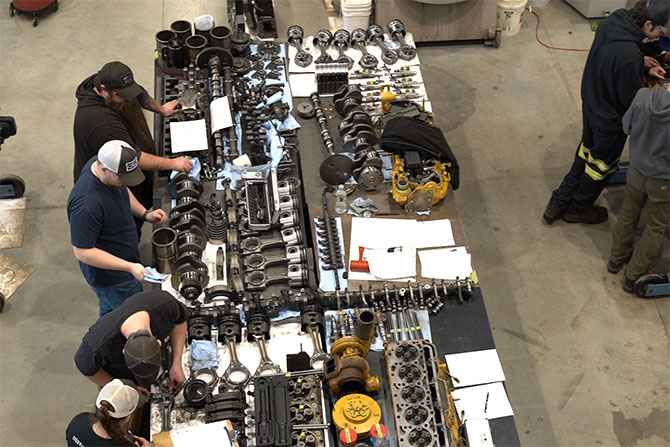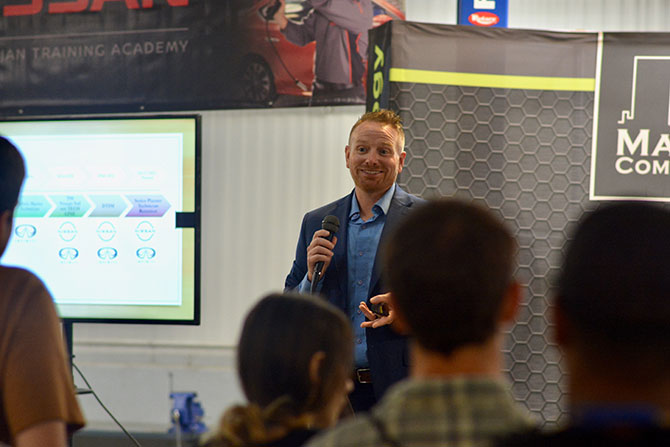Ford Motor Company Presentation
On January 23, we had the opportunity to meet with several employees from Ford Motor Company, including Simone Nunoo, the SEO Technical Placement Manager. Together, we discussed the local dealer landscape, training centers, and of course, technician recruitment.
Ford intently listened to NHADA’s workforce recruitment and retention strategies. It was clear that we both were in agreement that a key to growing a healthy workforce includes collaboration between educational providers and industry.
Donating to local automotive schools, joining advisory boards and taking on interns/part-time employees are all examples of how the industry can support automotive education. Additionally, onboarding today’s youth can be made easier by providing multiple exposure to the local dealer body outside of their classrooms. This can be accomplished with industry visits to classrooms, field trips out to industry and job shadows or internships.
Once the industry has piqued a student’s interest, it is important to have a career pathway to put in front of them. This can be a simple sheet of paper from the employer showing career growth timelines that are attached to certification, tenure and task qualifications. A future technician has to see the potential in the career as other markets are extremely competitive with entry-level wages. This also serves as a good retention tool by giving today’s youth a pathway for growth and potential.
Once hired, it is important to assign a qualified mentor. This can be the absolute biggest key in technician retention. It has been shown that an entry-level technician who has someone investing time into them is far more likely to stay with the company than someone who was hired and left in a lube bay to see if they make it. This is also a great strategy to fast track a technician’s productivity, growth and technical abilities.
There are many different opinions of what the perfect recruiting, growth and retention strategies could look like depending on the landscape of your shop. The important thing is to have one. Get involved with your local tech center and develop a system that works for both you and the school. This will ensure a steady workforce pipeline for years to come. For more information, please feel free to reach out to me at amemmolo@nhada.com.
ApprenticeshipNH Phase II
Since its inception, ApprenticeshipNH has served as a resource to support and educate our future workforce in a structured and intentional way. Phase one of ApprenticeshipNH includes $2,000.00 in tuition, which covers Intro to Automotive (Maintenance and Light Repair) as well as Basic Electrical at one of our five Community College System of New Hampshire (CCSNH) locations. Additional resources include wage matching up to $15.00/hour, and now, even basic tools to get started can be covered. With the completion of 2,000 work hours and specific tasks completed in industry, an entry-level technician will become a phase one completer. This gives employers a technician with a firm foundation to get started in the industry.
But what if you have a technician that wants more? Future A-Tech on your hands? In partnership with Merchants Fleet in Hooksett, the New Hampshire Automotive Education Foundation has finalized Phase II of the program. This includes the addition of CCSNH courses for braking systems as well as steering and suspension. Using NHADA’s job training grant, an employer can receive 50% of their investment back when sending a student/technician to these courses. Completing a total from phase one of 4,000 work hours and specific tasks completed in industry, a technician becomes a phase two completer.
It is our intention to follow up with a third phase to bring a technician all the way through an associate’s degree in applied science. This will provide a stackable solution to personalize technician training for anyone looking to pursue a career in automotive.
Joe Wentworth of Merchants Automotive highlights the program in strong support: “With the introduction of the ‘Tune Up Mechanic’ tier, Merchants Fleet proudly unveils the next level of our comprehensive apprenticeship program in partnership with NHADA. This tier represents a significant milestone in our ongoing mission to nurture and develop top-tier automotive talent. The progression to this second tier in our program is a testament to our commitment to providing an in-depth, hands-on learning experience for our apprentices, paving the way for their success in the automotive industry.”
To learn more on how to get involved with ApprenticeshipNH and grow your workforce, please reach out to me at amemmolo@nhada.com.
White Mountain Community College
Last month, we had the opportunity to visit the all-new Advanced Technology building in Littleton, New Hampshire. This new facility provides a state-of-the-art experience for students enrolled in The White Mountain Community College (WMCC) Diesel Heavy Equipment Program.
The WMCC building construction broke ground on Sept. 14, 2022. The 10,000-square-foot, two-story building will enhance WMCC’s program offerings in diesel heavy equipment technology, industrial mechanics, welding and new fields like electric vehicle technology.
The facility features a 5-ton bench crane that spans the length of the building — operable via a wireless remote — and a 30,000 lb scissor lift, underscoring the college’s commitment to hands-on, practical learning experiences. Additionally, a 10-booth welding lab and a hydraulic section on the lower floor, designed to facilitate learning through three classes beginning with Fluid Power, will be integral components of the new building. Highlighting the cutting-edge nature of this expansion, the facility will also house new equipment that boasts only 15 hours of use, ensuring that students have access to the latest in industry-standard technology for their education. This expansion marks a significant step forward in WMCC’s efforts to meet current and future workforce needs while also increasing access to quality education and training in high-demand fields.
This program will train a highly skilled and educated workforce. With the support of its industry partners, like the NHADA Foundation, technicians become trained and employed by the time they graduate. If you would like to learn more or collaborate with this amazing resource, please reach out to foundation@nhada.com.









